Hideki Matsui has been an ironman over the last 10+ years, playing in almost 1800 consecutive games between the Tokyo Yomiuri Giants and the New York Yankees. He’s led a storybook career to this point, and we turn our attention to his accomplishments in the shadow of a serious and season-threatening injury.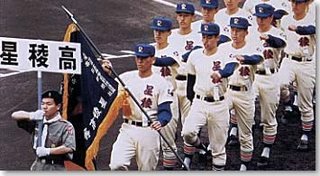 Matsui was nicknamed “Gojira” for his ferocious hitting and for his unusual size in high school, and some people say for his unfortunate bout with teen acne. At any rate, the slugger led Seiryo High School to the Koshien National High School Baseball Invitational (that's him with the flag), only to be intentionally walked 5 times in the Round of 8. His team lost and he was soon drafted by the famous Giants. It seems that the storybook life of Hideki Matsui was only beginning.
Matsui was nicknamed “Gojira” for his ferocious hitting and for his unusual size in high school, and some people say for his unfortunate bout with teen acne. At any rate, the slugger led Seiryo High School to the Koshien National High School Baseball Invitational (that's him with the flag), only to be intentionally walked 5 times in the Round of 8. His team lost and he was soon drafted by the famous Giants. It seems that the storybook life of Hideki Matsui was only beginning.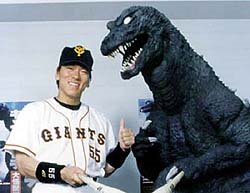 Matsui went on to become one of the greatest sluggers in the history of Japanese Pro Yakyu, and held the coveted #4 position in the "Kyoujin" lineup until his departure for the Big Apple after the 2002 season. He posted an incredible 50 home runs that season and a 1.153 OPS, the equivalent of Jimmie Foxx's 1933 season. His departure was made possible by the success of Ichiro Suzuki with the Seattle Mariners, and the only question that loomed was whether Matsui's power numbers would translate at all to Major League Baseball.
Matsui went on to become one of the greatest sluggers in the history of Japanese Pro Yakyu, and held the coveted #4 position in the "Kyoujin" lineup until his departure for the Big Apple after the 2002 season. He posted an incredible 50 home runs that season and a 1.153 OPS, the equivalent of Jimmie Foxx's 1933 season. His departure was made possible by the success of Ichiro Suzuki with the Seattle Mariners, and the only question that loomed was whether Matsui's power numbers would translate at all to Major League Baseball.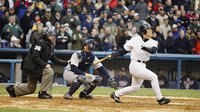 In his first Major League at bat, with the eyes of the world upon him, Hideki got himself an RBI single against the Toronto Blue Jays. Yankee fans will remember that as the game that Derek Jeter had his shoulder dislocated sliding into 3rd base. Matsui continued to drive in runs and quickly endeared himself to the Bronx faithful by crushing a grand slam into the right field bleachers against the Minnesota Twins in the home opener. That's when the love affair began in earnest.
In his first Major League at bat, with the eyes of the world upon him, Hideki got himself an RBI single against the Toronto Blue Jays. Yankee fans will remember that as the game that Derek Jeter had his shoulder dislocated sliding into 3rd base. Matsui continued to drive in runs and quickly endeared himself to the Bronx faithful by crushing a grand slam into the right field bleachers against the Minnesota Twins in the home opener. That's when the love affair began in earnest.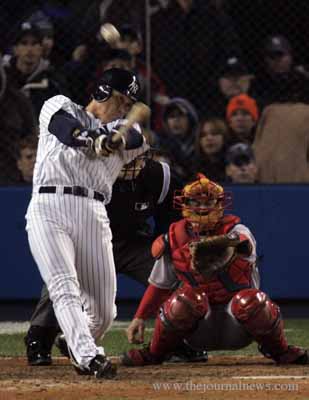 The power numbers weren't really there for Matsui in his first season. Despite the grand slam, only two long balls would leave his bat in the first two months of the season, and George Steinbrenner was heard to grumble about the money he was spending on his Japanese import without the power return. It was a faithful session in the batting cage before an interleague game with Cincinnati that helped Gojira get his bite back. Jorge Posada noticed that his hands were staying forward throughout the entire swing and that no power was being generated. Sure enough, with his hands loaded up again, Matsui blasted six homers in interleague play and went on to finish with 16 on the year. With a respectable .287 average, 16 home runs, 42 doubles, and 106 RBIs, Hideki Matsui had helped the Yankees to another division title and cemented his place in the Big Leagues. In the postseason, Matsui's finest moments were saved for the Red Sox in the ALCS. He hit .308 and had two huge doubles in Yankee Stadium's Game 7, the last being the table setting for Jorge Posada to tie the score late against Pedro Martinez. As the tying run, Matsui had given the team a chance to come back and win it in the 11th inning on that bit of Aaron Boone magic.
The power numbers weren't really there for Matsui in his first season. Despite the grand slam, only two long balls would leave his bat in the first two months of the season, and George Steinbrenner was heard to grumble about the money he was spending on his Japanese import without the power return. It was a faithful session in the batting cage before an interleague game with Cincinnati that helped Gojira get his bite back. Jorge Posada noticed that his hands were staying forward throughout the entire swing and that no power was being generated. Sure enough, with his hands loaded up again, Matsui blasted six homers in interleague play and went on to finish with 16 on the year. With a respectable .287 average, 16 home runs, 42 doubles, and 106 RBIs, Hideki Matsui had helped the Yankees to another division title and cemented his place in the Big Leagues. In the postseason, Matsui's finest moments were saved for the Red Sox in the ALCS. He hit .308 and had two huge doubles in Yankee Stadium's Game 7, the last being the table setting for Jorge Posada to tie the score late against Pedro Martinez. As the tying run, Matsui had given the team a chance to come back and win it in the 11th inning on that bit of Aaron Boone magic.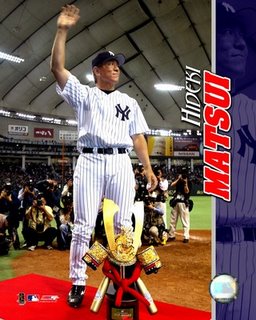 The following year, he was determined to find the famous home run stroke that had made him one of the most feared hitters in the history of his home country. The Yankees opened the season in Japan for exhibitions with Japanese clubs, and a pair of games against the Tampa Bay Devil Rays. Matsui won the MVP of the mini-tournament with a home run in the penultimate game. Posada deserved the award, but how can you argue with passing him up for the home town hero, who had homered in front of his parents? He was not to be denied his power surge on US soil as he nearly doubled his total to 31 home runs. Unfortunately, along with several of his teammates, Matsui's 2004 will be remembered for the collapse against those same Red Sox in the ALCS, allowing the bitter rival to go on to the Fall Classic and break the 86 year drought of World Series championships. Matsui hit 11-20 (.550) in the first 4 games of the ALCS, with 2 home runs, 10RBIs, and 8 runs scored. In the final 3 games he went cold, hitting only 3-14 (.214) with only 1 run and no RBIs. Better we all forget that terrible series.
The following year, he was determined to find the famous home run stroke that had made him one of the most feared hitters in the history of his home country. The Yankees opened the season in Japan for exhibitions with Japanese clubs, and a pair of games against the Tampa Bay Devil Rays. Matsui won the MVP of the mini-tournament with a home run in the penultimate game. Posada deserved the award, but how can you argue with passing him up for the home town hero, who had homered in front of his parents? He was not to be denied his power surge on US soil as he nearly doubled his total to 31 home runs. Unfortunately, along with several of his teammates, Matsui's 2004 will be remembered for the collapse against those same Red Sox in the ALCS, allowing the bitter rival to go on to the Fall Classic and break the 86 year drought of World Series championships. Matsui hit 11-20 (.550) in the first 4 games of the ALCS, with 2 home runs, 10RBIs, and 8 runs scored. In the final 3 games he went cold, hitting only 3-14 (.214) with only 1 run and no RBIs. Better we all forget that terrible series.
2005 was a good year for Gojira. His home run total fell to 23, but his average jumped above the .300 mark at .305, and he posted a stellar 45 doubles and 116 RBIs on the year. 2006 had been an up and down season so far for Matsui, but his swing was coming around lately and his presence in the middle of the Yankee order loomed very important as Gary Sheffield went down with a variety of bumps and bruises. All that changes on one fateful dive in the outfield on a Mark Loretta blooper. The Yankee lineup without Matsui looks thin. In the short term, it appears as though minor league talent, in combination with Bernie Williams and Bubba Crosby, will be asked to hold down the fort. I like Melky Cabrera a great deal and hope he get the opportunity to play on an everyday basis. I expect to see good things from him. The other side of the outfield is a much bigger question. Bernie is a huge liability in the field, Bubba Crosby's bat is light, and a second minor leaguer makes things very inexperienced. In the long term, I virtually guarantee the Yankees make a run at Torii Hunter of the Twins. His bat doesn't belong in the cleanup spot, as it is in the northern territories, but it won't have to be on the Yankees. His ability to play centerfield at a Gold Glove level would solve a lot of problems, and should he join the Yankees around the trade deadline in July, certainly adding him to the rifle arm and power bat of Gary Sheffield would strengthen our team once again. Only time will tell.
The Yankee lineup without Matsui looks thin. In the short term, it appears as though minor league talent, in combination with Bernie Williams and Bubba Crosby, will be asked to hold down the fort. I like Melky Cabrera a great deal and hope he get the opportunity to play on an everyday basis. I expect to see good things from him. The other side of the outfield is a much bigger question. Bernie is a huge liability in the field, Bubba Crosby's bat is light, and a second minor leaguer makes things very inexperienced. In the long term, I virtually guarantee the Yankees make a run at Torii Hunter of the Twins. His bat doesn't belong in the cleanup spot, as it is in the northern territories, but it won't have to be on the Yankees. His ability to play centerfield at a Gold Glove level would solve a lot of problems, and should he join the Yankees around the trade deadline in July, certainly adding him to the rifle arm and power bat of Gary Sheffield would strengthen our team once again. Only time will tell.
As for the impact of Matsui's injury on other fronts, clearly his ability to completely come back from a wrist injury has to be proven. Hitting is mainly in the legs, hips, and wrists, and aside from a back injury, a broken wrist is a tough rehab for an over 30 power hitter. I think he'll be able to get back this year, but we'll likely only see a singles hitter down the stretch, and it wouldn't surprise me to see a lot of nights in the DH slot if he can come back.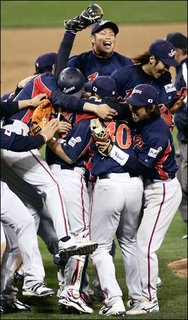 Not having Matsui out there everyday also hurts the Yankees/Yomiuri relationship to a degree. With a lot tied up financially in Matsui's presence in the Yankee lineup, Yomiuri now has to be cringing at the loss on their investment. There's a big Yomiuri Shimbun sign on the right field wall that is prominently featured everytime Matsui goes yard in the Bronx. With fewer viewers in Japan, the worth of that sign goes down considerably. It hasn't been a good year for Matsui's image in Japan. His refusal to participate in the World Baseball Classic was received coldly by the Japanese, especially after Ichiro signed on. The Yankee outfielder seemed to roll with the punches as he was criticized in the media, but the stunning Japanese win catapulted the team's members into the pantheon of national heroes while Matsui sat home watching on television. Not only wasn't he there, but his countrymen won the whole thing without his help. Adding this injury to his controversial offseason, can't help his image as a favorite son of Japan. He may go quietly into the night until the Yankees win the whole thing again.
Not having Matsui out there everyday also hurts the Yankees/Yomiuri relationship to a degree. With a lot tied up financially in Matsui's presence in the Yankee lineup, Yomiuri now has to be cringing at the loss on their investment. There's a big Yomiuri Shimbun sign on the right field wall that is prominently featured everytime Matsui goes yard in the Bronx. With fewer viewers in Japan, the worth of that sign goes down considerably. It hasn't been a good year for Matsui's image in Japan. His refusal to participate in the World Baseball Classic was received coldly by the Japanese, especially after Ichiro signed on. The Yankee outfielder seemed to roll with the punches as he was criticized in the media, but the stunning Japanese win catapulted the team's members into the pantheon of national heroes while Matsui sat home watching on television. Not only wasn't he there, but his countrymen won the whole thing without his help. Adding this injury to his controversial offseason, can't help his image as a favorite son of Japan. He may go quietly into the night until the Yankees win the whole thing again.
The coming weeks and months will be important for Matsui and the Yankees. We'll have to keep an eye on his surgery, rehab, and timetable. The Yankees will have to live without his timely hitting and occasional power. Most importantly, I will have to sit on the edge of my seat every weekend, hoping the masters of NHK will continue to show Yankee broadcasts even without their homegrown star in the game. It will be a long and dismal summer if they leave the Yankees out in favor of Tadahito Iguchi or additional Mariners games. Stay tuned.....
Friday, May 12, 2006
Godzilla vs. Misfortune
Subscribe to:
Post Comments (Atom)

1 comment:
Stunning! 2 thumbs up. I will love to retire and just read post like this.
Dwarka Restaurants
Post a Comment